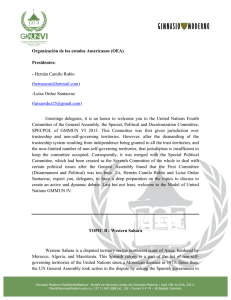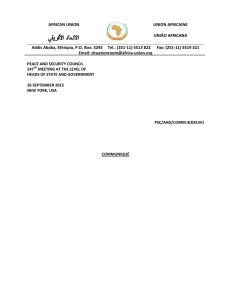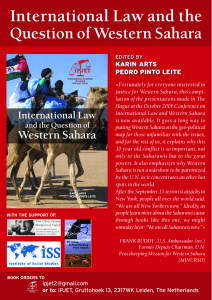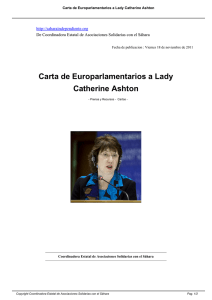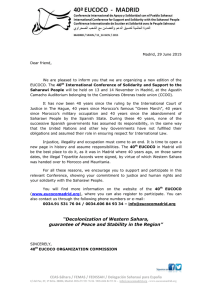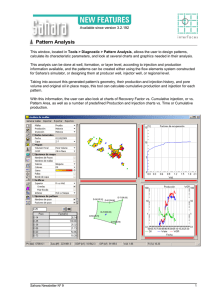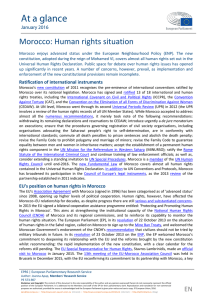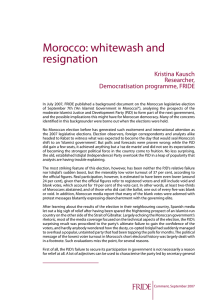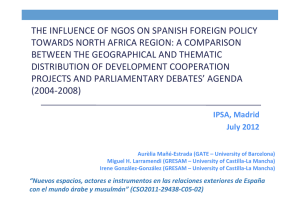Timeline of Western Sahara
Anuncio
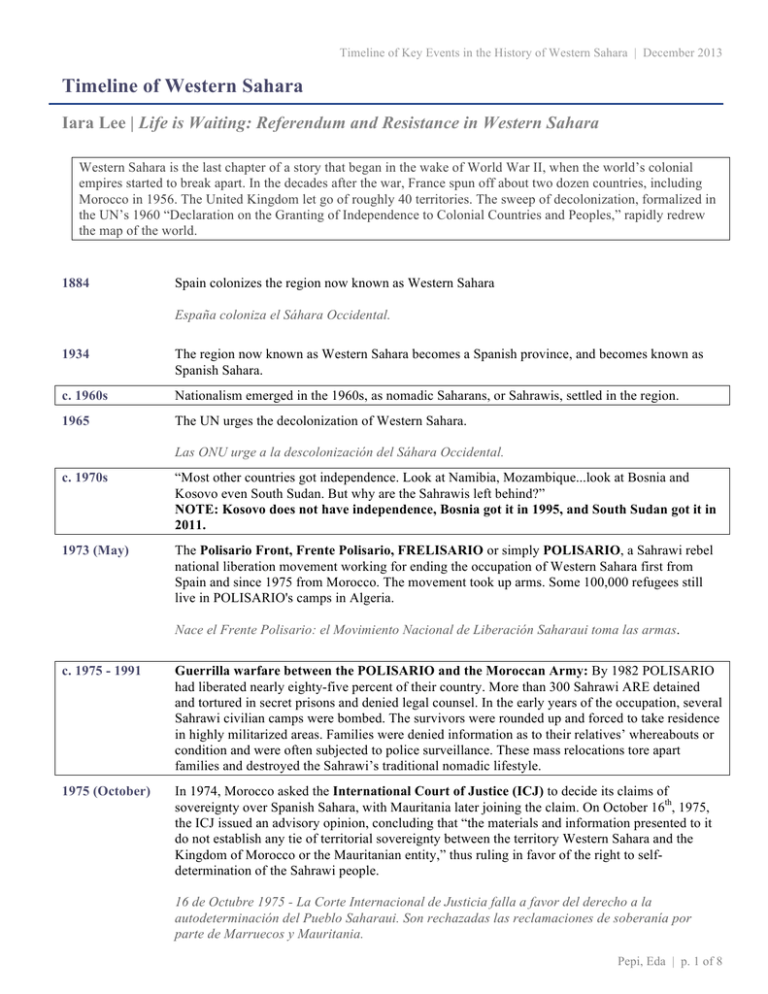
Timeline of Key Events in the History of Western Sahara | December 2013 Timeline of Western Sahara Iara Lee | Life is Waiting: Referendum and Resistance in Western Sahara Western Sahara is the last chapter of a story that began in the wake of World War II, when the world’s colonial empires started to break apart. In the decades after the war, France spun off about two dozen countries, including Morocco in 1956. The United Kingdom let go of roughly 40 territories. The sweep of decolonization, formalized in the UN’s 1960 “Declaration on the Granting of Independence to Colonial Countries and Peoples,” rapidly redrew the map of the world. 1884 Spain colonizes the region now known as Western Sahara España coloniza el Sáhara Occidental. 1934 The region now known as Western Sahara becomes a Spanish province, and becomes known as Spanish Sahara. c. 1960s Nationalism emerged in the 1960s, as nomadic Saharans, or Sahrawis, settled in the region. 1965 The UN urges the decolonization of Western Sahara. Las ONU urge a la descolonización del Sáhara Occidental. c. 1970s “Most other countries got independence. Look at Namibia, Mozambique...look at Bosnia and Kosovo even South Sudan. But why are the Sahrawis left behind?” NOTE: Kosovo does not have independence, Bosnia got it in 1995, and South Sudan got it in 2011. 1973 (May) The Polisario Front, Frente Polisario, FRELISARIO or simply POLISARIO, a Sahrawi rebel national liberation movement working for ending the occupation of Western Sahara first from Spain and since 1975 from Morocco. The movement took up arms. Some 100,000 refugees still live in POLISARIO's camps in Algeria. Nace el Frente Polisario: el Movimiento Nacional de Liberación Saharaui toma las armas. c. 1975 - 1991 Guerrilla warfare between the POLISARIO and the Moroccan Army: By 1982 POLISARIO had liberated nearly eighty-five percent of their country. More than 300 Sahrawi ARE detained and tortured in secret prisons and denied legal counsel. In the early years of the occupation, several Sahrawi civilian camps were bombed. The survivors were rounded up and forced to take residence in highly militarized areas. Families were denied information as to their relatives’ whereabouts or condition and were often subjected to police surveillance. These mass relocations tore apart families and destroyed the Sahrawi’s traditional nomadic lifestyle. 1975 (October) In 1974, Morocco asked the International Court of Justice (ICJ) to decide its claims of sovereignty over Spanish Sahara, with Mauritania later joining the claim. On October 16th, 1975, the ICJ issued an advisory opinion, concluding that “the materials and information presented to it do not establish any tie of territorial sovereignty between the territory Western Sahara and the Kingdom of Morocco or the Mauritanian entity,” thus ruling in favor of the right to selfdetermination of the Sahrawi people. 16 de Octubre 1975 - La Corte Internacional de Justicia falla a favor del derecho a la autodeterminación del Pueblo Saharaui. Son rechazadas las reclamaciones de soberanía por parte de Marruecos y Mauritania. Pepi, Eda | p. 1 of 8 Timeline of Key Events in the History of Western Sahara | December 2013 1975 (Nov) On November 6, 1975, immediately after the decision of the ICJ, Moroccans participate in “The Green March” (known to Sahrawis as “The Black March”) when King Hassan II of Morocco called on 300,000 civilians to move into and claim Spanish Sahara as their own. The Moroccan government used the mass demonstration strategically to force Spain to hand over the disputed, autonomous semi-metropolitan Spanish Province of Sahara to Morocco. 1975 (Nov) By 1975, in the face of growing international pressure and fierce fighting by the newly formed Polisario, Spain is ready to relinquish what was then called Spanish Sahara. NOTE: Key to this was also “The Green March,” orchestrated by the Moroccan government. Following the Spanish evacuation of Spanish Sahara, Spain, Morocco, and Mauritania signed the Madrid Accords on November 14, 1975, leading to both Morocco and Mauritania moving in to annex the territory of now known as Western Sahara. Spain and Portugal were slower to unwind their dominions. The most notable of those, East Timor, suffered near genocidal violence when Indonesian forces took control from Portugal in 1975. After a bloody referendum in 1999, East Timor finally got its independence, but it remains impoverished and corrupt, largely because of this damaging process. 1975 (Dec) Spanish Sahara becomes known as Western Sahara. 1976 (Feb) Spain withdraws on February 27th, 1976. The Sahrawi Arab Democratic Republic (SADR) is proclaimed by the Polisario Front in Bir Lehlu, Western Sahara. Moroccan planes bombard Sahrawi civilians fleeing the conflict with napalm and cluster bombs. Tens of thousands of Sahrawis take refuge in Tindouf, located in the south-western part of the Algerian desert. Their descendants remain there to this day. 27 de Febrero- España se retira. Se autoproclama la RASD, el Estado Saharaui en el exilio. Aviones marroquíes bombardean con napalm y bombas racimo a los civiles saharauis que huyen del conflicto. Decenas de miles de Saharauis se refugian en el desierto del sudoeste argelino, en Tindouf, donde siguen con sus descendientes hasta hoy en día. 1976 (Aug) The current Sahrawi Arab Democratic Republic (SADR) president, Mohamed Abdelaziz, was elected POLISARIO secretary-general in August 1976. 1979 (Aug) When Mauritania, under pressure from POLISARIO guerrillas, abandoned all claims to its portion in August 1979, Morocco moved to occupy that sector shortly thereafter and has since asserted administrative control over the whole territory. 1981 - 1987 Moroccans build a 2,500 km wall separating the Free Territories of Occupied Sahara. It is the world's largest defensive structure. Over 5,000,000 mines and 100,000 Moroccan soldiers guard what Saharawi call the Wall of Shame. Los marroquíes construyen un muro de 2.500km que separa los Territorios Ocupados del Sáhara Liberado. Es la estructura defensiva más larga del mundo. Más de 5.000.000 de minas y 100.000 soldados marroquíes custodian lo que los saharauis llaman el Muro de la Vergüenza. 1984 Morocco leaves the Organization of African Unity in protest at the SADR's admission to the body, and it has not rejoined since. POLISARIO claims to have killed more than 5,000 Moroccan soldiers between 1982-85. Pepi, Eda | p. 2 of 8 Timeline of Key Events in the History of Western Sahara | December 2013 1988 Moroccan and POLISARIO representatives agree on the joint OAU-UN Settlement Plan, which envisioned a cease-fire and a transitional period followed by a referendum, which would enable the people of Western Sahara to choose between independence and integration. c. 1975 - 1991 Guerrilla warfare between the POLISARIO and the Moroccan Army: By 1982 POLISARIO had liberated nearly eighty-five percent of their country. More than 300 Sahrawi ARE detained and tortured in secret prisons and denied legal counsel. In the early years of the occupation, several Sahrawi civilian camps were bombed. The survivors were rounded up and forced to take residence in highly militarized areas. Families were denied information as to their relatives’ whereabouts or condition and were often subjected to police surveillance. These mass relocations tore apart families and destroyed the Sahrawi’s traditional nomadic lifestyle. 1991 The United Nations Mission for the Referendum in Western Sahara (MINURSO), the United Nations peacekeeping mission in Western Sahara, is established under the United Nations Security Council Resolution 690 as part of the Settlement Plan, which had paved way for a cease-fire in the conflict between Morocco and the Polisario Front over the contested territory of Western Sahara. This settlement included plans for a referendum on self-determination for early 1992. Se firma un alto el fuego auspiciado por Naciones Unidas: la MINURSO entra en el Sáhara Occidental para organizar un referéndum de autodeterminación para principios de 1992. 1991 (Jun) After the UN brokered cease-fire, the Moroccan government frees 324 former Sahrawi that were initially disappeared. 1992 The independence referendum was originally scheduled for 1992, but it does not held due to opposition from Morocco. NOTE: Sources cite conflicts over voter eligibility and note that both sides blamed each other. El referéndum no se celebra debido a la oposición de Marruecos. 1996 (May) The UN suspends the identification process for voter eligibility in a referendum and recalls most MINURSO civilian staff. Military personnel stayed to oversee the truce. 1997 James Baker mediates in talks between POLISARIO and Morocco in London, Lisbon and Houston. 1999 (Sep) - 2004 The First Sahrawi Intifada The first Sahrawi Intifada was a part of the on-going Western Sahara conflict for independence. It transformed into the Independence Intifada or the Second Intifada in 2005. The main phase lasted from September 1999 to early 2000. The first of successive peaceful uprisings in occupied Western Sahara (1999, 2001, 2005, and 2010) due to the lack of human and economic rights for the Sahrawi people, as well as due to the lack of progress in the referendum process. Sucesivos levantamientos pacíficos en el Sáhara Occidental ocupado, debido a la inexistencia de derechos humanos y económicos para la población saharaui, y la falta de progreso en el proceso del referéndum. 2000 James Baker mediates in talks between Polisario and Morocco in London. Agreements were reached on the release of prisoners of war, a code of conduct for a referendum campaign, UN authority during a transition period - but not on voter eligibility. Further talks were held in Berlin and Geneva in 2000, but again ran into trouble. Pepi, Eda | p. 3 of 8 Timeline of Key Events in the History of Western Sahara | December 2013 2000 - 2002 In November 1999, Sahrawi political activists, who had been jailed and “disappeared”, formed the Truth and Justice Forum, which sought government redress for human rights violations and injustices. A Sahara branch of this group was formed in El Aaiún on August 26th, 2000. The Moroccan government had little tolerance toward the Sahara Branch and, in November 2002, Moroccan courts created legislation to outlaw the organization. 2001 (Jun) In a new bid to break the deadlock, James Baker submits a "Framework Agreement," known as the Third Way. It provides for autonomy for Sahrawis under Moroccan sovereignty, a referendum after a four-year transition period, and voting rights for Moroccan settlers resident in Western Sahara for over a year. This formula is rejected by POLISARIO and Algeria. 2001 - 2006 In 2001, Morocco created the Equity and Reconciliation Commission (ERC) to address the many remaining cases of forced disappearance carried out between 1956 and 1999 and to recommend reparations for the victims and their families. The Commission report, published in January 2006, referred only to 36 unresolved Sahrawi cases, while also noting that of those, 23 individuals were killed while in prolonged arbitrary detention and 13 were sentenced to death. Many people believe that it has failed to satisfy scores of victims on both sides of the conflict and that their recommendations have not been fully implemented, denying access to justice, truth, and reparation to many victims. 2001 (Nov) King Mohammed VI (son, and as of 1999, successor of King Hassan II) starts a controversial tour of Western Sahara, the first by a Moroccan monarch for a decade. 2003 - 2004 In July 2003, the UN adopts a compromise resolution proposing that Western Sahara become a semi-autonomous region of Morocco for a transition period of up to five years. A referendum would then take place on independence, semi-autonomy or integration with Morocco. This compromise is seen as addressing Moroccan concerns, in a bid to entice it to agree to a referendum. POLISARIO signals its readiness to accept, but Morocco rejects the plan, citing security concerns. Envoy James Baker resigns in June 2004 and the UN process remains deadlocked. In August of the same year, Kofi Annan appointed Alvaro de Soto as Special Representative for Western Sahara. Special Representative de Soto left his position in May 2005 and Peter van Walsum of the Netherlands took his place. Van Walsum oversaw four rounds of talks until August 2008. 2005 (May - Nov) The Second Sahrawi Intifada (a.k.a. the Independence Intifada of Sahrawi, the May Intifada, or The El Aaiún Intifada) The “Camp of the Dignity of Gdeim Izik” was later established near El Aaiún, where this intifada began. 2006 The OHCHR conducts a mission to Western Sahara, producing a report confidentially transmitted to Algeria, Morocco, and the POLISARIO. The report, which called for continuous monitoring of the human rights situation in Western Sahara and the refugee camps, was leaked and quoted on several websites and in news articles. 2008 (Mar) Talks resume between Morocco and the Polisario Front in March 2008 in New York, with Mauritania and Algeria also attending. They make no progress. 2009 -2012 In January 2009, U.S. Ambassador Christopher Ross is appointed as the new Personal Envoy of the Secretary General. From August 2009 to April 2012, Ross conducted nine rounds of informal Pepi, Eda | p. 4 of 8 Timeline of Key Events in the History of Western Sahara | December 2013 talks between Morocco and the POLISARIO, with Algeria and Mauritania attending as observers. The May 2012 Secretary General Report on the Situation concerning Western Sahara raised concerns over a lack of UN access and the undermining of MINURSOs ability to fulfill its mandate as a neutral party. Following the release of the report, Morocco announced the withdrawal of confidence in Christopher Ross. The UN maintained confidence in Ross and in October 2012 Ambassador Ross was allowed to visit Western Sahara for the first time since his nomination as Envoy. 2009 (Aug) WIKILEAKS cable: In a recently-released cable from the U.S. charge d'affairs in the U.S. embassy in Morocco, Robert P. Jackson, he makes the assertion that the independence struggle is essentially an Algerian creation, ignoring decades of popular resistance and longstanding Sahrawi nationalism which pre-dated Algeria's support for the nationalist Polisario Front. He bases this claim on the fact that because the POLISARIO has failed to claim Sahrawi-populated parts of southern Morocco as part of the Western Sahara state, this somehow proves that the struggle is "less nationalist than geopolitical, linked to the much older dispute between Algeria and Morocco, and hardly boosts the case for an independent state." 2009 (Oct) On October 8, 2009, seven Sahrawi human rights activists returning from a visit to the Sahrawi refugee camps in Algeria are arrested by Moroccan police in Casablanca. The Casablanca Group, as they later became known, publicly criticized the government of Morocco and King Mohammed VI in a press conference that aired on Algerian television. They were referred to a military court and charged with harming external state security and treason. Four of the activists were released on humanitarian grounds and the remaining three were granted royal pardons in April 2011. The case was then referred to a civilian court in Casablanca, where two trials ensued, one on October 15, 2010, and the second on November 5, 2010. The group is currently on provisional release, pending a final decision. Among the group are three well-known human rights defenders: Ali Salem Tamek, vice-president of CODESA; Brahim Dahan, President of the ASVDH; and Degja Lachagar. 2009 (Nov) Western Sahara activist, Amintou Haidar -- campaigner for indigenous Sahrawi rights -- goes on hunger strike at the Lanzarote airport in Spain after being expelled from her home country by Moroccan authorities over her refusal to accept Moroccan nationality. After participating in a peaceful demonstration in 1987, Haidar was arbitrarily detained and held incommunicado for four years. During this time, Haidar was tied to a wooden plank with her head down and repeatedly kicked; she had chemical-soaked cloths forced in her mouth and received electric shocks all over her body. Throughout the entire period of her detention, Haidar was kept blindfolded and held in solitary confinement. After her release from prison, Haidar faced repression from Moroccan authorities. On June 17, 2005, during a nonviolent demonstration in El Aaiún, Moroccan police beat Haidar, broke three of her ribs, caused a head wound that required 12 stitches, followed her to the hospital where she was treated for her injuries and arrested her. She was then detained for seven months in El Aaiún’s Black Prison Amintou Haidar: With the hunger strike that occurred in Lanzarote airport in 2009, I wanted to demonstrate that international law, individual and collective rights of the persons, and dignity, are above economic and political interests. It was a victory for my people, which gave the Saharawi cause the focused attention of international media. … That victory strengthened us, and in less than a year we were able to organize the Camp of the Dignity of Gdeim Izik. AMINATOU HAIDAR: Con la huelga de hambre que realicé en el aeropuerto de Lanzarote en el 2009 yo quería demostrar que la legalidad internacional, los derechos individuales y colectivos de las personas, y su dignidad, están por encima de los intereses económicos y políticos. Fue una victoria para mi pueblo: aquellos días la causa saharaui centró la atención mediática Pepi, Eda | p. 5 of 8 Timeline of Key Events in the History of Western Sahara | December 2013 internacional. … Esa victoria nos fortaleció, y en menos de un año fuimos capaces de organizar el Campamento de la Dignidad de Gdeim Izik. 2010 (Apr) A bipartisan majority of the US Senate goes on record calling on the United States to endorse Morocco’s illegal annexation of Western Sahara. 2010 (Oct/Nov) The protest tent city, “Camp of the Dignity of Gdeim Izik,” grows outside the city of El Aaiún. (NOTE: El Aaiún is where the 2005 Intifada began.) Several people are killed in violent clashes between Moroccan security forces and protesters shortly before UN-mediated talks on the future of the territory were due to open in New York. It is considered a prelude to the Arab Springs. On November 8th, 2010 the Camp was violently evacuated by Moroccan security forces causing fatalities. NOTE: 24 Sahrawis were arrested and convicted in February 2013 with sentences ranging from 20 years in prison to life imprisonment. The Saharawi people still awaits and hopes of being able to vote to decide on its future. Many voices clamor for return to arms; they feel betrayed by the UN, Spain, USA, France and the rest of the European Union. Crece el Campamento de la Dignidad de Gdeim Izik a las afueras de El Aaiún: es considerado el preludio de las Primaveras Árabes. Es desalojado violentamente por parte de las fuerzas de seguridad marroquíes causando víctimas mortales. … El Pueblo Saharaui sigue esperando poder votar para decidir sobre su futuro. Muchas voces claman por la vuelta a las armas: se sienten traicionados por la ONU, España, EEUU, Francia y el resto de la Unión Europea. 2011 (May) May 4th is a landmark in Western Sahara history: More than 6,000 Sahrawis protested peacefully demanding the right to self determination and independence. 2012 (Aug) During the Robert F. Kennedy Center’s visit, the delegation receives hundreds of testimonies from Sahrawi men and women victims of human rights violations at the hands of Moroccan authorities – reproduced anonymously in their report. 2013 (Feb) UN Special Rapporteur on Torture, Juan Méndez’s final report on his visit to Morocco and Western Sahara states: “torture and ill-treatment were used to extract confessions and that protestors were subjected to excessive use of force … and that members of the Sahrawi population are specifically, but not exclusively victims of such violations.” 2013 (Apr) The US backs calls for the UN to monitor human rights in the territory, prompting another rift with Morocco. The US redeployed forces intended for joint military exercises in Morocco in April 2013 after Morocco cancelled them. In spite of all the evidence of human rights violations, the UN Security Council has extended MINURSO's mandate more than 20 times, but has not approved a human rights mandate for MINURSO. Pepi, Eda | p. 6 of 8 Timeline of Key Events in the History of Western Sahara | December 2013 References Amnesty International. 2009. "No More Half Measures: Addressing Enforced Disappearances in Morocco and Western Sahara." Accessed on 17 January 2014: http://www.amnesty.org/en/library/asset/MDE29/005/2009/en/cea70b17-d191-4f75-ad1c17587adcc35a/mde290052009en.pdf BBC. 2014 (January 7). "Western Sahara Profile." Accessed on 17 January 2014: http://www.bbc.co.uk/news/world-africa-14115273 ---- . 2013 (October 26). "Morocco Profile." Accessed on 17 January 2014: http://www.bbc.co.uk/news/world-africa-14123260 Marting Beristain, Carlos and Heloise Gonzalez Hidalgo, Heloise. 2012. " The Oasis of Memory." Accessed 17 January 2014: http://publicaciones.hegoa.ehu.es/publications/284 Gimeno, Santiago. 2013. "Situación de los derechos civiles y políticos en el Sáhara Occidental: de 1999 a la actualidad. Cuadernos de Cultura de Paz No.3: Fundación Seminario de Investigación para la Paz. Human Rights Watch. 2013 (June 21). "Morocco/Western Sahara: Dubious Confessions, Tainted Trials." Accessed on 17 January 2014: http://www.hrw.org/news/2013/06/21/moroccowestern-sahara-dubious-confessions-tainted-trials Robert F. Kennedy Center for Justice & Human Rights. 2013. "Nowhere to Turn: The Consequences of the Failure to Monitor Human Rights Violations in Western Sahara and Tindouf Refugee Camps." Accessed on 17 January 2014: http://rfkcenter.org/images/attachments/article/1884/NowhereToTurnLoRes.pdf Zunes, Stephen. 2013 (December 22). "Obama Ignores Morocco’s Illegal Occupation and Human Rights Abuses." Huffington Post. Accessed 17 January 2014: http://www.huffingtonpost.com/stephen-zunes/obama-ignores-moroccos-il_b_4486108.html ---- . 2013 (June). "War, Nationalism, & Conflict Irresolution." Accessed 17 January 2014: http://publicaciones.hegoa.ehu.es/publications/284 ---- . 2013 (June 3). "The Last Colony: Beyond Dominant Narratives on the Western Sahara Roundtable." Accessed 17 January 2014: http://stephenzunes.org/2013/06/03/the-last-colony-beyond-dominant-narratives-on-the-western-sahararoundtable/ ---- . 2012 (August 2). "The Reality of Western Sahara." Accessed 17 January 2014: http://stephenzunes.org/2012/08/02/the-reality-of-western-sahara/ ---- . 2012 (July 25). "Divesting from all Occupations." Accessed 17 January 2014: http://stephenzunes.org/2012/07/25/divesting-from-all-occupations/ ---- . 2010 (December 7). "WikiLeaks Cables on Western Sahara Show Role of Ideology in State Department." Accessed 17 January 2014: http://stephenzunes.org/2010/12/07/wikileaks-cables-on-western-sahara-show-role-of-ideology-in-statedepartment/ ---- . 2010 (November 17). "Upsurge in repression challenges nonviolent resistance in Western Sahara." Accessed 17 January 2014: http://stephenzunes.org/2010/11/17/upsurge-in-repression-challenges-nonviolent-resistance-in-western-sahara/ ---- . 2010 (November 15). "Interview: Zunes on Western Sahara." Accessed 17 January 2014: http://stephenzunes.org/2010/11/15/interview-zunes-on-western-sahara/ Pepi, Eda | p. 7 of 8 Timeline of Key Events in the History of Western Sahara | December 2013 ---- . 2010 (April 5). "U.S. Lawmakers Support Illegal Annexation." Accessed 17 January 2014: http://stephenzunes.org/2010/04/05/u-s-lawmakers-support-illegal-annexation/ ---- . 2009 (December 5). "The Other Occupation: Western Sahara and the Case of Aminatou Haidar." Accessed 17 January 2014: http://stephenzunes.org/2009/12/05/the-other-occupation-western-sahara-and-the-case-of-aminatou-haidar/ ---- . 2009 (December 2). "A Tale of Two Human Rights Awardees." Accessed 17 January 2014: http://stephenzunes.org/2009/12/02/a-tale-of-two-human-rights-awardees/ ---- . 2008 (October 9). "Haidar’s Struggle." Accessed 17 January 2014: http://stephenzunes.org/2008/10/09/haidars-struggle-2/ ---- . 2007 (July 20). "The Future of Western Sahara." Accessed 17 January 2014: http://stephenzunes.org/2007/07/20/the-future-of-western-sahara/ ---- . 2007 (July 18). "More harm than good." Accessed 17 January 2014: http://stephenzunes.org/2007/07/18/more-harm-than-good/ ---- . 2006 (February 1). "Western Sahara: The Other Occupation." Accessed 17 January 2014: http://stephenzunes.org/2006/02/01/western-sahara-the-other-occupation/ ---- . 2003 (September 1). "Self Determination Struggle in the Western Sahara Continues to Challenge the UN." Accessed 17 January 2014: http://stephenzunes.org/2003/09/01/self-determination-struggle-in-the-western-sahara-continues-to-challengethe-un/ ---- . 2001 (June 1). "UN Betrayal of Western Sahara." Accessed 17 January 2014: http://stephenzunes.org/2001/06/01/un-betrayal-of-western-sahara/ ---- . 2001 (June 1). "Western Sahara (Conflict Profile)." Accessed 17 January 2014: http://stephenzunes.org/2001/06/01/western-sahara-conflict-profile/ ---- . 2001 (June 1). "UN Betrayal of Western Sahara Appears Imminent." Accessed 17 January 2014: http://stephenzunes.org/2001/06/01/un-betrayal-of-western-sahara-appears-imminent/ ---- . 1998 (December 1). "Morocco and Western Sahara." Accessed 17 January 2014: http://stephenzunes.org/1998/12/01/morocco-and-western-sahara/ ---- . 1989 (January 10). "US Should Reassess Policy in Western Sahara ." Accessed 17 January 2014: http://stephenzunes.org/1989/01/10/us-should-reassess-policy-in-western-sahara/ Pepi, Eda | p. 8 of 8
